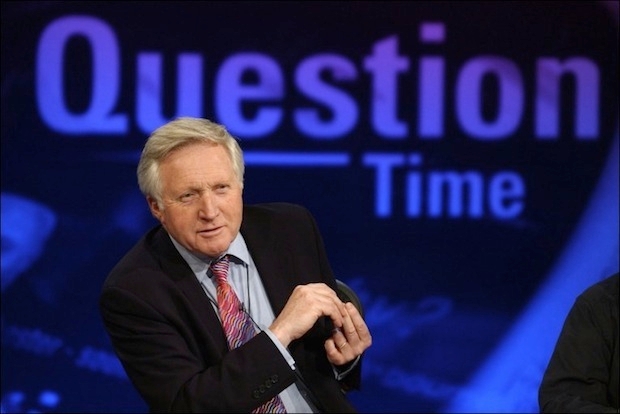Autumn is here, and so the political classes celebrate the return of Any Questions and Question Time. (The Dimbleby is the only species that hibernates during the summer.) This year, though, listen out for the one thing missing from both programmes: rhetoric. Over recent series politicians and pundits have shrugged off the oratory. Instead they talk normally, like normal people in a normal setting. And thank God for that.
In the bad old days, discussion programmes were full of panellists giving it the full Winston. Contributions started ‘I’m very glad to have the opportunity of addressing this vital, and, if I might say so, crucial issue,’ then meander, via countless ‘moreover’s and ‘furthermore’s, to a conclusion that should have been reached in a third of the time and with a fifth of the adjectives. The same old tricks got turned again and again. The list, each item repeating a word or phrase (‘when will this government act on crime?’ ‘When will this government act on immigration?’) Reading out a quote the audience was meant to think came from one side only to reveal it came from the other (‘your words, Minister, your words in the House last year.’) Ending a sentence with ‘and so on and so forth’ to cover up the fact you’d run out of things to say.
Above all speakers ignored the rule that writers soon learn: the best language is the simplest language. If you can cut something out without altering your meaning, it shouldn’t have been there in the first place. ‘I would just say this,’ for example. Don’t bother with that, just say the thing itself – you’re going to anyway. It was never enough that a policy achieved nothing – it had to achieve ‘nothing whatsoever’. (Or rather ‘whatsoever’.) You got the feeling some contributors were one angry moment away from a ‘verily I say unto thee’.
It was understandable that the older generation behaved like this. They’d seen Churchill win a war with speeches, and they wanted to be like him. You could at least forgive the ones who were good at it, who made you laugh, like Michael Foot. But the rest just sounded ridiculous. As they’d have known if they’d listened to Mrs Cadwallader in Middlemarch: ‘A man always makes a fool of himself, speechifying.’
So why has the bombast come to an end? Clearly it’s been a gradual process, part of the trend that’s seen politicians more closely resemble the people who elect them. But I think two specific factors have played their part. The first is Yes Minister. Today’s generation of MPs (and indeed commentators) grew up watching Jim Hacker’s thumbs rise to his lapels every time he strayed into mimicking Churchill. They realised that the slurring and phrase-making were something to be laughed at, especially when you were discussing proposed changes to VAT. Now that those people are in power themselves, they’re not going to make the same mistake. They know they’re on the box, not a soapbox.
The second factor is David Dimbleby. With every episode of Question Time the twinkle in his eye gets that little bit brighter, proof that he knows how far into unsackability he has travelled. As a result he’s damned if he’s going to let wordy panellists waste his precious airtime, and so regularly hands out verbal bitchslaps. To Andy Burnham: ‘Don’t read your notes, just answer the question’. To Lord Ashdown: ‘I don’t want you to talk forever, Paddy, come to the point.’ To the world in general: ‘There should be a self-denying ordinance on panel members using the phrase “the fact of the matter is”.’ The man’s a hero. Dimbleby Minor, on the other hand, is one of the few relics clinging to old-school verbiage, some of it self-invented. He insists on saying ‘our next’ instead of ‘our next question’, a bit like toffs who leave the ‘s’ off ‘pheasants’. Perhaps it’s younger-brother insecurity – does he want to appear older than he is?
The other relics? There’s Nigel Farage, no doubt trying to distract us from the fact that he looks like Moe in The Simpsons. Also the aforementioned Good Lord Ashdown, who has inherited Neil Kinnock’s habit of narrowing his eyes while he pontificates, as if scanning the horizon for his own approaching place in history. (Keep looking mate.) In fact come to think of it, Kinnock himself must have been another factor educating today’s politicians away from oratory. With the legendary Sheffield rally of 1992 they saw him literally talk himself out of becoming Prime Minister. People have grown beards waiting for Neil Kinnock to finish a sentence.
Some of the old dogs, mind you, have learned new tricks, or rather learned to stop doing tricks full stop. Kenneth Clarke used to love the verbal gymnastics. His most annoying habit was the dramatic-pause-before-the-last-word-even-when-it-was-obvious-what-that-word-was-going-to-be. ‘This is a bold and courageous move by the Chancellor of the … er … er … Exchequer’. Just get on with it, Ken. By and large, he now does. Like his longtime colleague Lord Heseltine, Clarke has stayed current by keeping not just his eyes but also his ears open to the modern political scene.
The end of rhetoric can only be good for democracy. Representatives who talk to the voters in everyday language might actually stand a chance of engaging those voters. Today’s audiences know that if a subject is worth debating on Question Time or Any Questions it is, by definition, complicated. There won’t be any certainties, just different positions, all with their good points and bad. Shades of grey, in other words. And you can’t use shades of grey to paint sunlit uplands.






Comments